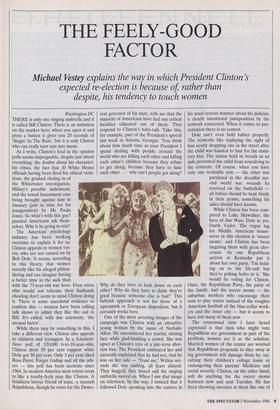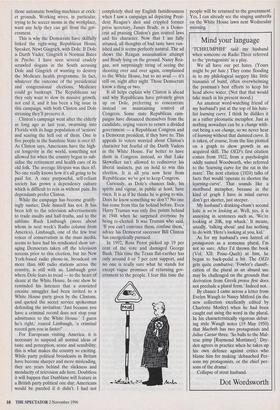THE FEELY-GOOD FACTOR
Michael Vestey explains the way in which President Clinton's
expected re-election is because of rather than despite, his tendency to touch women
Washington DC THERE is only one singing umbrella and it is called Bill Clinton. There is an imitation on the market here; when you open it and press a button it gives you 20 seconds of `Singin' In The Rain', but it is only Clinton who can really turn rain into music.
The American psychology industry has been working overtime to explain it for us. Clinton appeals to women vot- ers, who are not turned on by Bob Dole. It seems, according to this theory, that women secretly like his alleged philan- dering and can imagine having a better time in the sack than with the 73-year-old war hero. Even wives who would not tolerate their husbands cheating don't seem to mind Clinton doing it. There is some anecdotal evidence to confirm this — women have been calling talk shows to admit they like the cad in Bill. It's called, with due solemnity, 'the arousal factor'.
While there may be something in this, I take a different view. Clinton also appeals to children and teenagers. In a Scholastic News poll of 320,000 6-to-18-year-olds, Clinton drew 58 per cent support while Dole got 38 per cent. Only 3 per cent liked Ross Perot. Forget Gallup and all the oth- ers — this poll has been accurate since 1964. In modern America most voters seem to like a touchy-feely man like Clinton. A Southern lawyer friend of mine, a staunch Republican, though he votes for the Demo- crat governor of his state, tells me that the majority of Americans have had any critical faculties educated out of them. They respond to Clinton's baby-talk. Take this, for example, part of the President's speech last week in Atlanta, Georgia: 'You think about how much time as your President I spend dealing with people around the world who are killing each other and killing each other's children because they refuse to get along, because they have to hate each other . . why can't people get along?
Why do they have to look down on each other? Why do they have to think they're good because someone else is bad?' This babyish approach is not for those of a squeamish or European disposition, but it certainly works here.
One of the most arresting images of the campaign was Clinton with an attractive young woman by the name of Nathalie Allen. He encountered her tearful, shining face while glad-handing a crowd. She was upset at Clinton's veto of a late-term abor- tion ban. The President embraced her and earnestly explained that he had not, that he was on her side — 'Trust me.' Within sec- onds she was smiling, all fears allayed. They hugged, they kissed and the singing umbrella moved on. When I saw that image on television, by the way, I noticed that it followed Dole speaking into the camera in his usual serious manner about his policies, a clearly intentional juxtaposition by the network concerned. When it comes to pre- sentation there is no contest.
Dole can't even hold babies properly. The networks like replaying the sight of him nearly dropping one in the street after the child was handed to him for the statu- tory kiss. The nation held its breath as an aide prevented the child from nosediving to the concrete. Of course, when you have only one workable arm — the other was paralysed in the dreadful sec- ond world war wounds he received on the battlefield all babies should be kept firmly in their prams, something his aides should have known.
While Clinton has been com- pared to Luke Skywalker, the hero of Star Wars, Dole is, yes, Darth Vader. The vogue tag for Middle American house- wives in this election is 'soccer moms', and Clinton has been targeting them with great clev- erness. As one Republican activist in Kentucky put it about her own party, 'I'm hold- ing on to the life-raft but they're poking holes in it.' She would be voting for Clinton. Once, the Republican Party, the party of the family, had the soccer moms — the suburban mothers who encourage their sons to play soccer instead of the rougher American football of the blue-collar work- ers and the inner city — but it seems to have lost many of them now.
The consensual view I have heard expressed is that men who might vote Republican see government as part of the problem, women see it as the solution. Married women of the centre are worried that Republican proposals to slice away at big government will damage them by, say, cutting their children's college loans or endangering their parents' Medicare and social security. Clinton, on the other hand, will do anything for the soccer moms between now and next Tuesday. He has been throwing sweeties at them like one of those automatic bowling-machines at crick- et grounds. Working wives, in particular, trying to be soccer moms in the workplace, want any help they can get from the gov- ernment.
This is why the Democrats have skilfully linked the right-wing Republican House Speaker, Newt Gingrich, with Dole. If Dole is Darth Vader, Gingrich is Norman Bates in Psycho. I have seen several crudely scrawled slogans in the South accusing Dole and Gingrich of wanting to destroy the Medicare health programme. In fact, whatever the outcome of the presidential and congressional elections, Medicare could go bankrupt. The Republicans say they only want to slow its massive growth, not end it, and it has been a big issue in this campaign, with both Clinton and Dole stressing they'll preserve it.
Clinton's campaign went after the elderly as long ago as last year, swarming into Florida with its huge population of 'seniors' and scaring the hell out of them. One in five people in the Sunshine State is over 65. As Clinton says, Americans have the high- est longevity in the world, something not allowed for when the country began to sub- sidise the retirement and health care of its old folk. The average lifespan was then 65. No one really knows how it's all going to be paid for. A once purposeful, self-reliant society has grown a dependency culture which is difficult to rein in without pain. Its dependants prefer Clinton.
While the campaign has become gratify- ingly nastier, Dole himself has not. It has been left to the television advertisements to trade insults and half-truths, and to the sublime Rush Limbaugh (more about whom in next week's Radio column from America). Limbaugh, one of the few true voices of conservatism in the mass media, seems to have had his syndicated show sav- aging Democrats taken off the television screens prior to this election, but his New York-based radio phone-in, broadcast on more than 600 radio stations across the country, is still with us. Limbaugh goes where Dole fears to tread — to the heart of sleaze at the White House. In one show he reminded his listeners that a convicted cocaine smuggler had been invited to a White House party given by the Clintons, and quoted the secret service spokesman defending the invitation: 'Just because you have a criminal record does not stop your admittance to the White House.' I guess he's right,' roared Limbaugh, 'a criminal record gets you in faster!'
For Europeans visiting America, it is necessary to suspend all normal ideas of taste and perception, sense and sensibility; this is what makes the country so exciting. While party political broadcasts in Britain have become sharper and more misleading, they are years behind the slickness and mendacity of television ads here. Doubtless it will happen that Dunblane will feature in a British party political one day; Americans would be puzzled if it didn't. I had not completely shed my English fastidiousness when I saw a campaign ad depicting Presi- dent Reagan's shot and crippled former press secretary, James Brady, in a Demo- crat ad praising Clinton's gun control laws and his character. Now that I am fully attuned, all thoughts of bad taste have van- ished and it seems perfectly natural. The ad shows the Reagan assassination attempt and Brady lying on the ground. Nancy Rea- gan, not surprisingly tiring of seeing the shooting over and over again, complained to the White House, but to no avail — it's still on, night after night. Those Democrats know a thing or two.
It all helps explain why Clinton is ahead and why Republicans have privately given up on Dole, preferring to concentrate instead on maintaining control of Congress. Some state Republican cam- paigns have distanced themselves from the candidate, urging voters to return a divided government — a Republican Congress and a Democrat president, if they have to. This appeals to voters worried about Clinton's character but fearful of the Darth Vaders in the White House. Far better to have them in Congress instead, so that Luke Skywalker isn't allowed to rediscover his liberal instincts, put on hold to win this election. It is all you now hear from Republicans: we've got to keep Congress.
Curiously, as Dole's chances fade, his spirits and vigour, in public at least, have risen. It is as if he thinks he is going to win. Does he know something we don't? No one has come from this far behind before. Even Harry Truman was only five points behind in 1948 when he surprised everyone by being re-elected. It was Truman who said, `If you can't convince them, confuse them,' advice his Democrat successor Bill Clinton has energetically pursued.
In 1992, Ross Perot picked up 19 per cent of the vote and damaged George Bush. This time the Texan flat-earther has only around 6 or 7 per cent support, and no one is really sure what he stands for except vague promises of returning gov- ernment to the people. I fear this time the people will be returned to the government. Yes, I can already see the singing umbrella on the White House lawn next Wednesday morning.



















































































 Previous page
Previous page